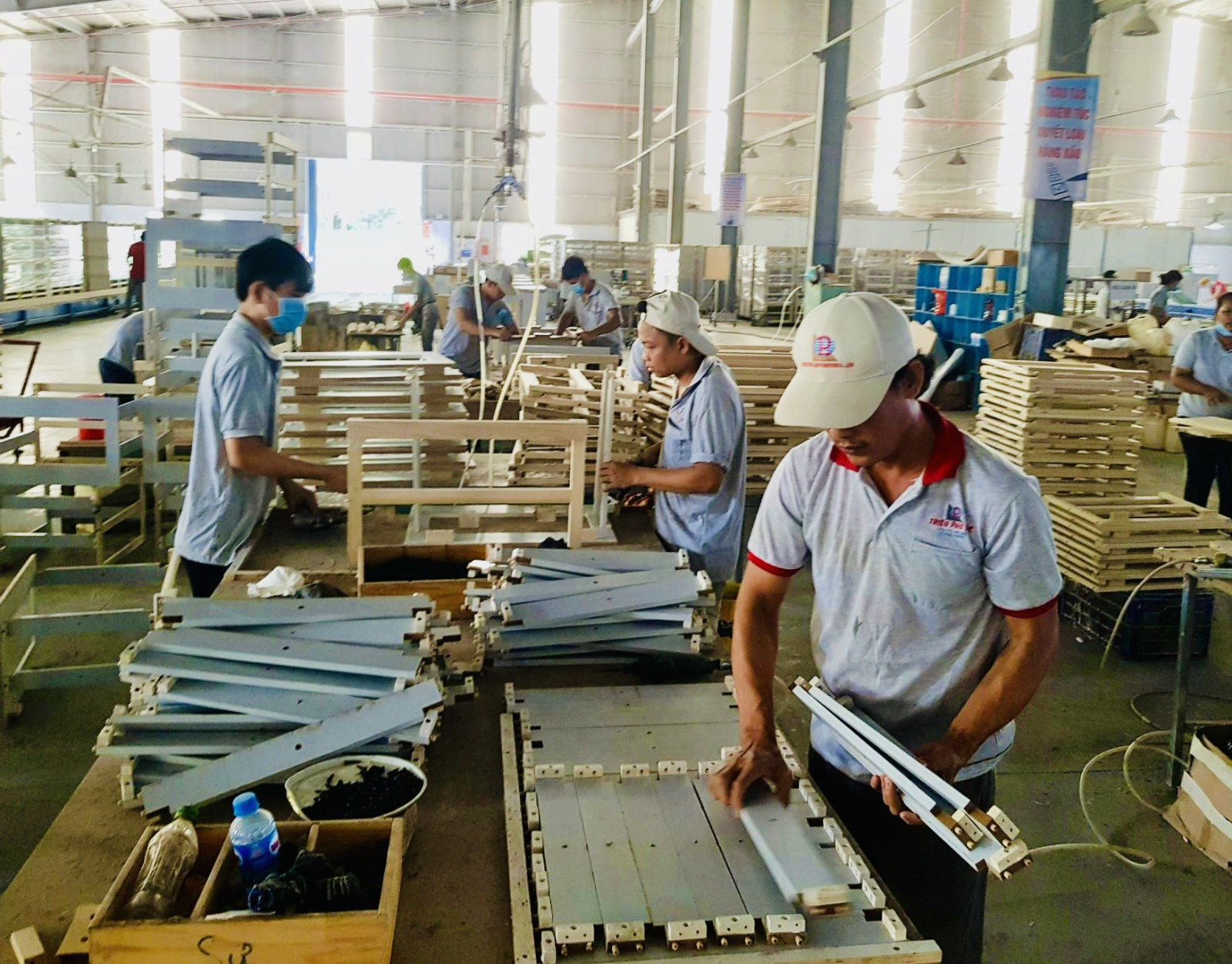Commodity origin faking, alarming
The feedbacks of industry associations indicate that the current situation of counterfeit goods has affected the reputation of businesses greatly in the international markets. As counterfeit goods uncovered by countries will be handled according to international regulations, significantly impacting on businesses as well as the reputation of Vietnamese goods.
Cooperation invited to mark Vietnamese origin
According to Mr. Nguyen Liem, Chairman of Binh Duong Furniture Association (BIFA), the situation of counterfeit wood products originating from Vietnam to evade taxes on exporting to other countries not only causes direct economic losses but also negatively affects the reputation and brands of the domestic woodwork industry. In fact, Vietnam has recently become the subject of anti-dumping lawsuits against a wide range of products.

Furniture manufacturers show concerns of being affected by concurrently complicated trade frauds. In this photo: Trieu Phu Loc Company is producing furniture in Bac Tan Uyen district
“Various entities are using all means and methods to bring goods without origin labels into Binh Duong for business operations and consumption. Additionally, groups of individuals are establishing multiple companies with various types of goods, equipment, and components to assemble complete products under the Made in Vietnam brand,” Mr. Nguyen Liem said in his analysis.
Specifically, Vietnam's woodwork industry is facing risks of tax evasion, anti-dumping, and anti-subsidy duties that exist in some exported items to the US market. The risk arises when these items or components are imported, assembled in Vietnam, and labeled with Vietnamese origin without meeting the necessary certification requirements, and then exported to the US. Many businesses in Binh Duong have been affected this way.
In fact, as Vietnam participates in more and more free trade agreements, alongside the benefits they bring, fraudulent origin practices are also becoming more prevalent. Some groups of foreign goods producers have taken advantage of bringing goods into Vietnam, falsifying the origin of Vietnamese goods for export to enjoy tax incentives reserved for member countries of such the agreements.
Mr. Pham Van Xo, Chairman of the provincial Import-Export Association, expressed the concern that goods originating from foreign countries are being transshipped through Vietnam to legitimize documents or apply for certificates of origin before exporting to a third country. With a series of tactics employed by individuals for fraudulent origin of goods, and infringement of intellectual property rights, the task of detection and counterstrike becomes increasingly challenging. Mr. Pham Van Xo stated: “I have received invitations for collaboration to establish a company assembling pre-manufactured goods from abroad under a Vietnamese brand. Some members of the import-export association have also received such collaboration invitations. However, we understand the risks associated with those collaboration invitations and have outrightly declined. This fraudulent behavior has seriously impacted many domestic manufacturing sectors.”
Protective measures needed for enterprises
Xo proposes that authorities and sectors in the near future need to proactively research measures on trade defense to enhance protection for domestic production and market against international integration requirements. Particularly and currently, commercial fraud is becoming more sophisticated.
Meanwhile, Liem shared that Vietnam hads signed many bilateral and multilateral trade agreements under foreign investment laws; therefore, all technical measures to restrict foreign investment to borrow the origin of Vietnamese furniture must be based on the law and international commitments that had been signed. Countries worldwide, currently, restrict trade fraud by requiring supply chain verification. An exporting company must prove its position within the supply chain of the product. Otherwise, the company is undoubtedly engaging in origin fraud. Vietnam needs to adopt such an approach to prevent foreign-invested companies from bypassing products and borrowing Vietnam's origin. To achieve this, it is essential to control both outputs and inputs, including domestic enterprises.
Discussing with us about the issue of foreign goods imported into Vietnam for re-export to a third country to enjoy tax benefits and other advantages, Mr. Nguyen Thanh Binh, Deputy Director of the provincial Customs Department, stated: “Binh Duong, with over 85% of businesses operating in the processing, manufacturing, and export sectors enjoying tax exemptions, always harbors risks of trade fraud. Currently, we are focusing on implementing a comprehensive set of customs control measures, proactively reviewing policy inconsistencies to propose, recommend to competent authorities to amend, supplement, or issue new legal documents, to prevent entities from exploiting and committing violations. Along with emphasizing self-training, enhancing capacity for customs control forces is to ensure effective implementation of anti-smuggling and commercial fraud prevention work in the province.”
Reported by Tieu My – Translated by Vi Bao

